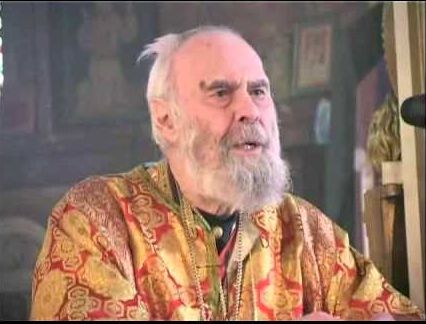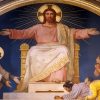…Now, if we think more of hope, we can see that hope is not only a dream, not only a longing, not only expectation. Hope is also a courageous attitude that consists in looking to the future from within the present moment. Analyze, try to understand the present moment and on the basis of what we know of now build the future together with the living God. And our God, as you know, is contemporary to all ages, all moments. He is not the God of yesterday; he is the same yesterday, today, tomorrow, and all eternity.
The old world known by my grandparents or my parents, the old world which I just touched a fringe of when I was a child is gone, and what is not gone is being destroyed either intentionally or unintentionally. So that world is not to be restored. But by looking into it as one looks into ancient civilization we can begin to acquire a new and deeper understanding of our present, because our present is made of the past and, I dare say also, of the future, because the history of the world is not a static situation made of a succession of present moments that die. It is in motion and the power that moves it is the action of God. I do believe that with all my heart and very passionately.
Now if I look at the present situation with my old eyes but I think with a heart that is not too old, what do I see? What are the things that rejoice me? You may have, at least those of you who are English readers, may have read books by C.S. Lewis. And C.S. Lewis uses a phrase which I think is very, very rare. He contrasts Christianity, which is in Gospel, which is all that can be born out of the Gospel or that is full of meaning and of truth, with churchianity which is what has evolved as a result of human efforts at making a society out of the fluidity of the Gospel. Being a man of the church I should be particularly enthusiastic about churchianity. I’m not. I was an unbeliever until I was in my middle teens. And the reason why I have become a believer is that I discovered the living God. I discovered God face to face in an experience which I will never forget in my life. I’ve come myself face to face with Christ risen. And so my root is in the discovery of him before whom I had to fall down in adoration and from whom I decided to learn. And learn in the Gospel. It is only later that I turned to the church to find out whether the church had anything to do with the message of Christ. And so there are things in the church which I admire, which I believe to be true, but there are things which really I find an object of misery. The first thing which comes to my mind is the fact that nowadays for the sake of keeping as many people together within the church both theologians and clergy and lay people who are responsible for the life of others water down the message of Christ, make the message of Christ relative, find ways of adjusting it to the life of the world while the vocation of Christians is to build the life of the world according to the Gospel and to make the city of men co-extensive to the city of God and not the other way round. So that the first thing which I see which is disastrous is the way we use the Gospel is maimed, adulterated, destroyed from within by the very people who should be the custodians and the defenders of the faith. The second thing which I see is that in more than one phrase the Gospel, and that applies I think to all Christian denominations, the Gospel has become the basis for church life but not a life according to the Gospel but a life of a community which recognises the Gospel as the word but not as life itself. When I ask myself why it is that in the beginning Christ and his small handful of disciples went deep enough, asked enough to hold in their embrace as it were, in their vision certainly, the whole of the cosmos, earth and heaven together and why it is that nowadays the Christian body and the Christian denominations have become small societies within a bigger society that is not interested in it or if interested only as a remnant of the past as a piece of archaeology, I would say because we do not live the Gospel. We do not live it intellectually, we do not live it in worship, we do not live it in action and life. And when I say action and life I do not mean social activities, political involvement, I mean something more personal. When I was a young man I was told that no one can abandon the world and turn wholeheartedly to eternity and to God who has not seen on the face or in the eyes of at least one person the shining of eternal light. And now I must ask myself and you who on earth meeting you or me would stop and say but is there in this person, that is in him or in her, a shining like I have not seen before in anyone or anywhere. So this is the challenge which is before us: to grow into the Gospel in such a way as to understand the mind of Christ, to acquire the mind of Christ, open ourselves to God, become transparent to such an extent that the light of God should shine through us.
And then there is another thing which I find tragic in the church. It is the way in which in all liturgical churches we have put, used, something that should be a way of conveying the divine, conveying the faith, conveying divine beauty and truth, at times into an independent beauty, a beauty separated from God which is appreciated independently from God, as art, and therefore conveys nothing anymore. I’m horrified when people look at Orthodox icons and say, “Oh yes, what a beautiful piece of art!” and do not see that the people who painted them expressed in the icons their spiritual experience. I’m horrified if people who come to an Orthodox service find our singing beautiful. At moments I think, “Oh, if only we could become so ugly that people should recognize the words and meanings instead of merging in the sound and forgetting about God and about the truth and about the words.” I’m horrified when in the Holy Week people look at a beautiful crucifix and forget the crucifixion.
And what I find awful, what rejoices me, is that more and more people fall away from the church, turn away from the artefacts in the church and say “No, we want a living God, we want reality, we want meaning and we are not satisfied with things which separate us from these things. And if there is nothing more to Christianity than all this esthetics then we’ll do without God, then with the idols which we are offered instead of the true, real and saving and living God”.
Another thing that rejoices me is a new praisal and awaking of the secular world. You know the Christians have a tendency to feel that they are the cat’s whiskers, they are the sweet selected few they are the marvellous little body of people who possess the truth and lead the life and have got everything.
But when you look at the world of the unbelievers, what they seem to ask is “We long for meaning in life. You say that you have it. Why is it that you cannot convey any of it to us?”
Then again, when we think of what the (first) believers were, with regard to the other world. In the 1 Corinthians 4 St. Paul speaks: “To the present hour we hunger and thirst, we are ill-clad and buffeted and homeless, and we labour, working with our own hands. When reviled, we bless; when persecuted, we endure; when slandered, we try to conciliate; we have become, and are now, as the refuse of the world, the offscouring of all things.” Who of us has ever been in that position and as St Paul, has rejoiced? None of us. And so, where are the seeds of hope? The seeds of hope reside in the hunger of the secular world. In the seeds which the Gospel has deposited in this world and which are forcing their way and claiming their right to occupy the whole space. The seeds of hope is in the crudeness of those Christians who can no longer bear churchianity and want the Gospel, who cannot bear approximations and adulterated truth and want radical truth and want a life according to the Gospel. My hope resides in this that in the Christian world there is a rebellion against everything which is fake, which is untrue, which is unreal, which is not in the purity, the integrity and the violence of the Gospel, and on the other hand, in the longing of the other world which needs it.
Abridged version by Tuija Kokko

















